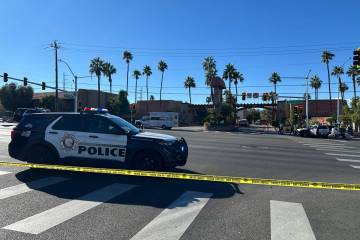Delays, redactions surround release of Las Vegas shooting records
In the aftermath of the Oct. 1, 2017, shooting, the Las Vegas Review-Journal requested any and all police records on the massacre.
But it took a monthslong legal fight and a Nevada Supreme Court order for the Metropolitan Police Department to start releasing them.
“Transparency about law enforcement responses to mass tragedies is vital and serves the public good,” Review-Journal attorney Maggie McLetchie said. “Rather than cooperate with requests, Metro delayed access to records. The lack of access to information caused confusion and fed conspiracy theories.”
The Review-Journal is highlighting the fight for the shooting records during Sunshine Week, an annual observance of the public’s right to government documents and data that keep agencies accountable. The newspaper on Sunday published another story outlining Metro’s continued fight to withhold sex trafficking and prostitution records.
Even when local judges determined that the department should hand over dispatch records, body camera footage, 911 calls, officer reports and volunteer statements related to the mass shooting, Metro attorneys engaged in “litigation delay tactics,” McLetchie said, “which only made matters worse.”
In April, District Judge Stefany Miley accused Las Vegas police of “gamesmanship.”
“It’s now months since the shooting occurred, and it’s still the same: delay, delay, delay,” Miley said. “If one technique doesn’t work, then you switch to another one. That’s very concerning for the court.”
The 2017 attack happened on the final day of the Route 91 Harvest festival. The gunman opened fire from his Mandalay Bay suite across the street, killing 58 country music fans and injuring more than 800. It is now regarded as the worst mass shooting in modern American history.
That night, more than 500 Las Vegas police officers descended on the scene. Some cleared the festival grounds. Others cleared Mandalay Bay hotel rooms. Dozens grouped up into strike teams, responding with paramedics to false calls up and down the Strip, reported in a panic as gunshot victims were ushered away from the venue.
Nearly every emergency agency in the county responded to assist, including private ambulances. Even park police came out to help, holding down at least one perimeter spot. Thirteen local hospitals took in patients.
The massive mobilization of emergency services was unlike anything the Las Vegas Valley had ever seen. The Review-Journal requested the records to examine it. Six months later, the newspaper started receiving them. But the legal fight continues.
“The Review-Journal and other media entities won a hard-fought battle for access, but Metro still refuses to provide information reflecting whether it has complied with the court’s orders,” McLetchie said. “It’s not clear what has and what hasn’t been produced, and there are serious questions about over-redactions and potentially missing information.”
Metro declined to comment.
‘It seems like a game’
The fight for the Las Vegas shooting records came to a head about a year ago, when District Judge Richard Scotti first ruled that Metro was obligated to begin handing over the records on a rolling basis.
He also ruled that the department could not charge journalists hundreds of thousands of dollars for the production of those records.
Instead of complying, the department asked for a new judge to reconsider the case. So the case was transferred to Miley’s courtroom.
But about a month later, when it was Miley’s turn, Metro attorneys asked to withdraw their motion for reconsideration and instead move forward with an appeal to the Supreme Court.
“All you’ve done is prolong the proceedings even further than it should have been, and that’s what’s very concerning to me,” Miley said at the time. “It seems like a game.”
Metro lawyer Jackie Nichols responded, “And I respect your honor, but I would disagree.”
About two weeks later, the Nevada Supreme Court ordered the department to begin producing the records. But not without protest from Clark County Sheriff Joe Lombardo, who in a news conference said the records stood to “further traumatize a wounded community.”
“We have always tried to protect the victims and their families of this incident,” Lombardo said. “Further victimization is certain to occur, and it is something we wanted to avoid.”
‘This is not rocket science’
Most of the documents were provided within about two months. But the body camera footage took about nine months to release as police worked to review and redact the videos.
Adam Marshall, staff attorney with the Reporters Committee for Freedom of the Press, said there has been a nationwide disconnect between the promise — and practice — of body camera technology.
“Body cameras were promoted and sold to the public as a tool of transparency that provided much needed information in cases of contested narratives and perhaps one-sided narratives,” Marshall said.
Yet legislatures across the country are enacting laws that limit or completely eliminate access to the footage, he said. Meanwhile, newsrooms struggle to see it.
Just last week, Las Vegas police did not allow a Review-Journal reporter to accompany family as they watched body camera footage of a relative dying in police custody. The move was contrary to the family’s wishes and in violation of the Nevada Public Records Act.
“Body cameras are not there to be just another evidence-gathering tool,” Marshall said. “They exist for the public’s benefit.”
As to how long it took for Las Vegas police to redact the Oct. 1 videos, Marshall said there are an “incredible array” of tools that can assist with redaction, including automated redaction.
“It’s entirely possible to redact video and to do so in a timely way,” he continued. “This is not rocket science.”
In January, Metro announced it had finished releasing all records from the mass shooting but provided no documentation to prove it. The Review-Journal continues to seek that documentation through a pending Supreme Court case.
About a month later, the Las Vegas Metropolitan Police Department Foundation hosted a gala that in part honored the department’s “1 October Redaction Unit,” which “for nine months reviewed and redacted thousands of pages of documents as well as examined hundreds of hours of body-worn camera footage from the tragedy,” according to a news release.
Review-Journal Executive Editor Glenn Cook responded to the event with concern.
“That a unit dedicated to limiting access to public information would be honored for blacking out public records — sometimes with no legal basis for doing so — is troubling,” Cook said.
He noted that Metro has long been hostile to public disclosure.
“Transparency builds confidence in policing,” Cook said. “Secrecy does the opposite.”
Contact Rachel Crosby at rcrosby@reviewjournal.com or 702-477-3801. Follow @rachelacrosby.


















